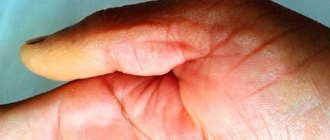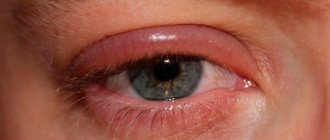Facial swelling is not only a cosmetic defect; if it appears frequently or is accompanied by redness and pain, it is a sign of quite serious health problems that need to be identified and treated.
ALENA PARETSKAYA
Pathophysiologist, immunologist, member of the St. Petersburg Society of Pathophysiologists ANDREY GRACHEV Leading cardiologist of the SM-Clinic holding, MD, academician of the Russian Academy of Medical Sciences
Facial edema is not a separate disease, but only a reflection of an imbalance between retention and excretion of fluid in the body. But what problems in the body can cause the face to swell and how serious is it?
Why does the face swell in adults?
Swelling on the face can occur at different times of the day - mainly in the morning or late afternoon, or they persist throughout the day, decreasing or increasing.
There are two types of reasons:
- physiological (or natural, not associated with diseases), they are usually not pronounced, not very strong, and disappear quickly;
- pathological, can be very strong, with changes in facial features, signs of inflammation, and are often quite persistent.
Each type of edema has the most typical causes; they occur mainly in the morning or evening hours, or do not depend in any way on the time of day. These characteristics are important for the doctor so that he can identify the leading causes and determine the tactics of examination and treatment.
Diagnostics
At the initial stage, patients with swelling on the face often go to therapists, who, depending on the clinical picture, diagnose themselves or refer patients to other specialists: allergists, endocrinologists, nephrologists, etc. To establish a diagnosis, the following methods are used:
- Questioning, external examination
. The doctor finds out the circumstances, frequency and time of swelling, the dynamics of changes during the day, throughout the menstrual cycle. Evaluates the severity and extent of edema, skin temperature, and tissue density. - Lab tests
. During laboratory tests, signs of inflammation are identified, kidney function is studied, and hormone levels are determined. According to indications, tests are done to identify allergies. - Ultrasound methods
. Taking into account the characteristics of clinical symptoms, ultrasound of the kidneys, thyroid gland, echocardiography, and other types of sonography are prescribed. - Other visualization techniques
. To clarify the diagnosis and detail pathological changes, CT and MRI, including those with contrast, can be used.
Skincare treatments help get rid of morning puffiness of the face
Is there swelling on the face due to heart disease?
Yes, these questions usually worry women, says cardiologist Andrei Grachev.
They run to see a cardiologist when they can’t put a ring on their finger in the morning because it’s swollen or put on makeup because their face is swollen. The patient wants to look great, regardless of age and health status. And this is commendable. Men, as a rule, do not contact a cardiologist with such questions. The peculiarity of this issue is due to the fact that in patients with cardiovascular diseases, as a rule, swelling on the face appears at the final stage of a complication such as heart failure. First, they appear on the legs (the lowest point in relation to the heart), then fluid accumulates in the abdominal cavity, the liver and spleen enlarge (as a blood depot). And only after the fluid reaches the pleural cavities and the heart sac, swelling may occur on the face or hands.
Causes of hand swelling
The most common reason why your hands are a little swollen in the morning is drinking too much liquid just before bed. The amount of food eaten, alcohol consumed, the general state of a person’s health and the functioning of his internal organs are also affected. Swelling of the hands may subside within a few hours of waking up. However, some swelling may not go away for several days or even weeks. The so-called “permanent symptom” of swollen hands can indicate the presence of obvious serious or even serious illnesses in a person, as well as a complication or exacerbation of any disease that existed before. There are also swellings that can only be relieved by taking diuretics.
Swelling of the hands often occurs in women during pregnancy, especially in the third trimester and just before childbirth. This occurs due to the fact that some bacteria or microbes penetrate the top layer of the skin through a small wound, cut or abrasion. With such an infection, the swelling site responds with severe pain when pressed, an increase in body temperature to 38-40 ° C, dizziness and severe headache are possible. Such swelling occurs quite rarely and most often affects pregnant women whose immunity is too weakened and is not able to resist even the simplest infection, as well as when the woman has suffered serious injuries. Any inflammatory process should never be left to chance; it must be immediately shown to a doctor and immediate treatment must begin, otherwise it may spread to other soft tissues, thereby increasing the swollen area.
Here are some factors that explain the cause of swelling of the phalanx of the fingers and what you need to do if you encounter this:
- the most common factor is a common finger bruise or injury, a fracture. The inflammatory process in this case is a completely understandable reaction; it is enough to apply cold for several hours and consult a doctor to avoid negative consequences;
- If the cause of swelling was a common allergic reaction to any cleaning or detergent, household chemicals, washing powder or fabric softener, then first of all it is necessary to find out what exactly such a reaction occurred to. In this case, you need to either exclude these products from use, or use them only when putting rubber gloves on your hands. They will protect your hands from the aggressive effects of chemicals;
- In addition to household chemicals, an allergic reaction that appears in the form of swelling of the hands can also be caused by exotic dishes or fruits. Which you have never tried before;
- Swelling of the hands can also appear due to insufficient blood circulation or blockage of blood vessels;
- Swelling of the fingers is quite normal for girls who are pregnant. Simply, if edema occurs, you should definitely tell your doctor about it and take a urine test, the results of which should not contain protein. Edema is a simple excess of fluid in soft tissues that can be relieved with diuretics;
- A significant change in the shape of the fingers with swelling of the hands may indicate serious problems with the thyroid gland. It is necessary to contact an endocrinologist and conduct examinations;
- Swelling of the hands can also be caused by poor functioning of the kidneys, liver, and heart failure;
- Another factor that manifests itself as swelling of the hands is long-term work without breaks or rest, poor and unhealthy diet, and insufficient and restless sleep. In this case, you should reconsider your life, try to change your work and rest schedule, set your priorities and start taking care of your health. Remember that elementary fatigue and lack of sleep are manifested primarily by swelling;
- Your hands can also swell from prolonged heavy physical activity, for example, carrying heavy objects or cutting boards for firewood during a long period of absence of rest, digging up a garden in the country or in the village - all these factors affect the condition of your hands. You shouldn’t work too hard, you need to think about your health in time and set a clear rest and work schedule in which you won’t overwork yourself too much.
Swelling of the hands can occur due to many reasons, everyone has their own and there are quite a lot of them. However, there is no point in trying to solve such a problem yourself or even putting it aside. It is better to consult a specialist who will not only identify the cause of swelling of the hands, but will also be able to prescribe you the correct treatment.
When do they occur most often?
Due to a number of circumstances, adds cardiologist Andrei Grachev, such as the flow of fluid to the upper half of the body in a lying position, changes in the biorhythms of hormone production (more often their active synthesis occurs at night or in the early morning hours), edema syndrome most often manifests itself in the early morning hours .
Morning
If we talk about physiological reasons, morning swelling is usually associated with constant lack of sleep, fasting or strict diets (limiting protein and fats). Sometimes swelling in the morning is caused by the wrong selection of skincare products (face cream, toner or cleanser). Also, morning swelling of the face can be caused by crying or stress in the evening or at night.
Possible swelling of the face in the morning due to an incorrectly selected pillow (it is too high, it provokes a narrowing of the blood vessels in the neck). Another physiological factor is an excess of fried, salty foods or liquids taken in the evening, before bed. In women, facial swelling in the morning can be caused by hormonal fluctuations, PMS or pregnancy. Some women report morning swelling during menopause.
Pathological causes of morning edema are mainly kidney damage. Such swelling is usually soft, mobile, appears on the face after sleep, and the skin acquires a waxy or yellowish tint. The most common causes of facial swelling are:
- glomerulonephritis - the acute form of the disease leads to edema, which lasts up to 2-3 weeks, if the process enters the chronic phase, edema is typical for periods of exacerbation of inflammation;
- Kidney amyloidosis - edema is typical of the second stage (proteinuria), when protein loss occurs and kidney function gradually deteriorates;
- membranous nephropathies - occur after taking certain medications, tumor therapy, acute infectious pathologies. Edema occurs in waves, with sharp or barely noticeable symptoms;
- chronic kidney disease (previously called renal failure) - swelling occurs gradually as renal damage progresses;
- kidney damage in severe systemic pathologies - edema is typical for nephropathy due to diabetes or systemic lupus erythematosus.
Evening
Sometimes facial swelling becomes noticeable in the evening, especially after an active day. Often this is one of the manifestations of pathologies of the cardiovascular system. Often, swelling of the face is accompanied by severe swelling in the area of the extremities - hands and feet, legs. These swellings are denser, the skin has a lower temperature than on other parts of the body, and such swelling goes away slowly. Often occur against the background of the following pathologies:
- amyloidosis of the heart and blood vessels;
- cardiomyopathy;
- sclerotic heart disease (cardiosclerosis);
- certain types of arrhythmia;
- constrictive pericarditis;
- some heart defects;
- arterial hypertension;
- cardiac lesions due to rheumatism.
Day
Sometimes facial swelling is most pronounced during the day or its appearance is not clearly related to the time of day. Among the main pathologies that lead to such edema are endocrine disorders - especially a lack of thyroid hormones (hypothyroidism). Facial swelling is especially pronounced with congenital hypothyroidism, in pregnant women or with autoimmune thyroiditis, cytokine-induced thyroiditis.
Rapidly increasing swelling of the face during the day can be a sign of allergies - to food, insect bites, cosmetics, medications and even cold. Sometimes facial swelling occurs during an attack of bronchial asthma due to difficulty breathing and fluid retention in the veins.
Facial swelling is possible in people who smoke and drink alcohol. This is due to the increased work of the lymphatic system to remove toxins from tissues.
Severe swelling of the face during the day is possible with respiratory infections and their complications - sinusitis, tonsillitis, frontal sinusitis. Swelling of the face is possible with a deficiency or excess of vitamins (especially fat-soluble ones).
Prevention methods
Timely prevention is the main condition for maintaining the health of the kidneys, heart and other organs at any age. Doctors have several recommendations on how to avoid swelling:
- choose foods with a minimum amount of salt, spices and sugar, avoid fatty and fried foods;
- give up bad habits - smoking and drinking alcoholic beverages;
- do not overeat before going to bed and do not drink a lot of liquid;
- undergo regular thyroid examinations and donate blood tests;
- choose orthopedic pillows and a sleeping mattress that will not impair cerebral circulation;
- prevent excess weight;
- Do simple physical exercises in the fresh air every day.
The Clinical Brain Institute offers individual programs for the diagnosis and treatment of various diseases that are accompanied by swelling in the face and headaches. Our center has precise, modern equipment that allows you to quickly assess the condition of internal organs and perform the necessary tests in the laboratory. Doctors are experienced specialists in a narrow and broad profile. They will prescribe a competent treatment regimen, but its effectiveness will depend, among other things, on following all recommendations at home.
How to quickly relieve facial swelling in adults
If this is physiological swelling of the face, not associated with serious pathologies that require medical supervision and the use of selected medications, excess fluid can be eliminated through certain simple measures and actions.
Taking a contrast shower or washing with cold/hot water. This method refreshes, increases tissue tone, enhances the outflow of fluid from the skin and reduces swelling.
Using ice – a couple of pieces of ice will help deal with swelling on the face quickly and effectively. In addition, you can prepare herbal decoctions with a tonic effect in advance and freeze them, using them for washing.
Facial massage is an effective remedy that helps improve microcirculation and swelling. Manual massage, the use of rollers, ice cubes, and cold spoons help. Sometimes you can first wipe your face with green tea and apply compresses with it to your face and eye area.
Express measures to relieve swelling
Antihistamines prescribed by a doctor will help quickly eliminate local swelling. They are recommended for non-systemic urticaria, hay fever, reactions to food or drinks. It is not recommended to exceed the dose recommended by a specialist.
Injections are more effective than tablets; within a quarter of an hour the swelling will subside.
Mild swelling that occurs due to fatigue, temperature changes or other external factors can be relieved with a cold compress. Gauze, folded in several layers, is moistened with cold water, lightly wrung out and placed on the face for 7-10 minutes. An alternative option is a quick massage with an ice cube. Contrast procedures are not recommended for rosacea and skin diseases. Instead of cold compresses, you can use creams and gels with aloe vera extract, which have a soothing and refreshing effect.
Doctors categorically do not recommend taking diuretics on your own. They cause dehydration, the body begins to retain water and swelling only intensifies. Uncontrolled use of diuretics can cause kidney disease and other health problems.
How do estradiol and progesterone affect water balance?
It turns out that reproductive hormones change the homeostatic parameters of body fluids. Estradiol decreases the osmoregulation operating point of arginine vasopressin (AVP) and increases plasma volume. When a person deals with the predominance of estrogen, his eyes literally become swollen.
Estradiol and progesterone are involved in the sensation of thirst, they influence the action of atrial natriuretic peptide (ANP), vasopressin, renin or aldosterone (they influence the sodium-potassium pump, that is, the management of electrolytes). Insufficient levels can lead to water retention in the body and problems with electrolytes.
The balance between the two hormones is also important. It often happens that the test for estradiol is normal, but progesterone is too low.
Thyroid problems
Hypothyroidism may cause problems with water management. Low levels of T3 and T4 slow down your metabolism, which contributes to intestinal and kidney problems. As a consequence, electrolyte management is impaired and therefore excessive water retention may occur. One study found that people with hypothyroidism are more sensitive to a diet rich in salt (mostly white salt added to processed foods), which makes them less likely to suffer from water problems.
Excessive water retention
As you know, water is necessary for the functioning of the body. Its amount in the body depends on gender and age - with age, the amount of water decreases. Obese people also have less water. Every day, the body releases a certain amount of water for detoxification purposes.
Sometimes water is retained in the body for various reasons. The person then deals with symptoms such as:
- Edema—swollen limbs, swollen eyelids, and swollen fingers and toes;
- Pain in the limbs;
- Weight gain, large weight fluctuations;
- Joint stiffness;
- Change in skin color;
- Flatulence;
- After pressing on the swollen area, the skin does not return to its place.
Prolactin
Excess prolactin can also affect water retention in the body. Breast tenderness usually occurs. High prolactin increases the amount of fat tissue and metabolic rate (a large number of women are unable to lose weight after childbirth due to high prolactin levels caused by breastfeeding).
Too much of this hormone reduces adiponectin levels (it affects a number of metabolic processes, especially the metabolism of glucose and fatty acids in the liver and muscles, indirectly affecting insulin sensitivity. Therefore, it is anti-inflammatory, anti-atherosclerotic and increases insulin sensitivity). Low levels of adiponectin predispose to diabetes.
How does swelling develop after alcohol?
Most often, alcoholic edema develops against the background of suppression of the urinary system by alcohol. Due to the effects of ethyl alcohol, the kidneys stop working normally and cannot remove fluid in a timely and complete manner. This is one of the signs of alcohol poisoning. Even short-term exposure of this kind leads to the accumulation of fluid in the soft tissues.
The soft tissues of the face are especially susceptible to such effects. This is why swelling occurs under the eyes and the eyelids swell. Puffiness of the face occurs. With a more severe manifestation, swelling spreads to the limbs.
The resources and capabilities of the liver are not limitless. With a large intake of alcohol into the body or a multi-day binge, the kidneys are blocked by toxins , since the liver cannot cope with alcohol in full. The longer the binge, the more pronounced the swelling. It is especially noticeable with a hangover.
Causes of Excessive Water Accumulation
Causes of water retention include:
- Liver problems;
- Too little protein in the diet;
- Poor hydration;
- Kidney problems;
- Excessive alcohol consumption;
- Heart problems;
- Too little traffic;
- Food allergies and intolerances;
- Pregnancy;
- Medicines—such as birth control pills or hormone replacement therapy, nonsteroidal anti-inflammatory drugs (such as pain relievers), beta blockers, SSRIs (antidepressants);
- Lack of sleep;
- Too much sodium in the diet.
How to get rid of very severe swelling?
If severe, pronounced swelling of the entire body occurs, this is a very dangerous symptom. It indicates significant problems with the body and the need to be examined by a doctor. In order to relieve such swelling, you will have to carry out a whole range of measures. For detoxification, it would be better to choose Smecta or similar drugs. You also need to buy mineral water, preferably alkaline. It should be drunk in large quantities to speed up the process of getting rid of edema . You need to use mild diuretics and start moving moderately. Walking will provide just the right amount of exercise that will help the body better cope with the problem. And healthy sleep will also come in handy. It will help restore strength.









